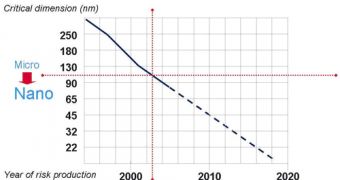The current technological process of building computer and general use chips is centered on the 45 or the larger 60 nanometer scale. This may soon change as a number for alliances and partnerships were agreed upon by most of the big players on the computer hardware market. One such agreement is between Toshiba, Fujitsu and NEC, all of them Asian companies, that wish to develop a technology to produce computer chips using the 32 nanometer process. These Asian companies see this agreement as a way to fight back other similar alliances formed by IBM, Intel, AMD and others.
A spokesperson from Toshiba said that his company is considering the possibility of a joint venture with NEC and Fujitsu in order to develop and produce the next generation computer chips using the 32 nanometers technology. The Japanese semiconductor and chip makers Fujitsu and NEC also denied that a permanent agreement was signed. According to Toshiba spokesperson Kaori Hiraki, cited by the Web site TechNewsWorld: "We are still studying various possibilities. We have not decided anything." Fujitsu also acknowledged its interest in an agreement between the three Japanese companies to develop a 32-nanometer technology "as part of a global trend involving the 32-nanometer chips."
Fujitsu spokesperson Hiroshi Tsuda also denied that a definitive agreement was signed, but confirmed the rumors saying that "What to do with the next-generation chip is actually a major interest across the industry". This agreement between the Japanese companies Toshiba, Fujitsu and NEC may come as a wider strategy to stop them from losing ground to foreign rivals like Intel and Samsung Electronics, as an alliance would help the companies share research and development costs and thus stay competitive at a global level. According to several technology developing companies, the cost associated with the research and development of a new computer chip making process can climb as high a $4 billion.
The Nikkei business newspaper reported that all three companies would send their engineers to form a team later this year to develop the new chip, which should enter mass production in about two years. According to Associated Press, the three companies should start hitting the market with their 32-nanometer chips no later than 2010, both as retail chips and as integrated chips in high-power home electronics. It is said that Toshiba will hold most of the shares of this joint venture. In May, IBM entered an alliance with Samsung, Chartered, Infineon and Freescale to join forces in an attempt to stop Intel from reaching the 32 nanometer production technology first. Intel has already some months in advance and it expects to begin computer chip production using the new technology in 2009.

 14 DAY TRIAL //
14 DAY TRIAL //